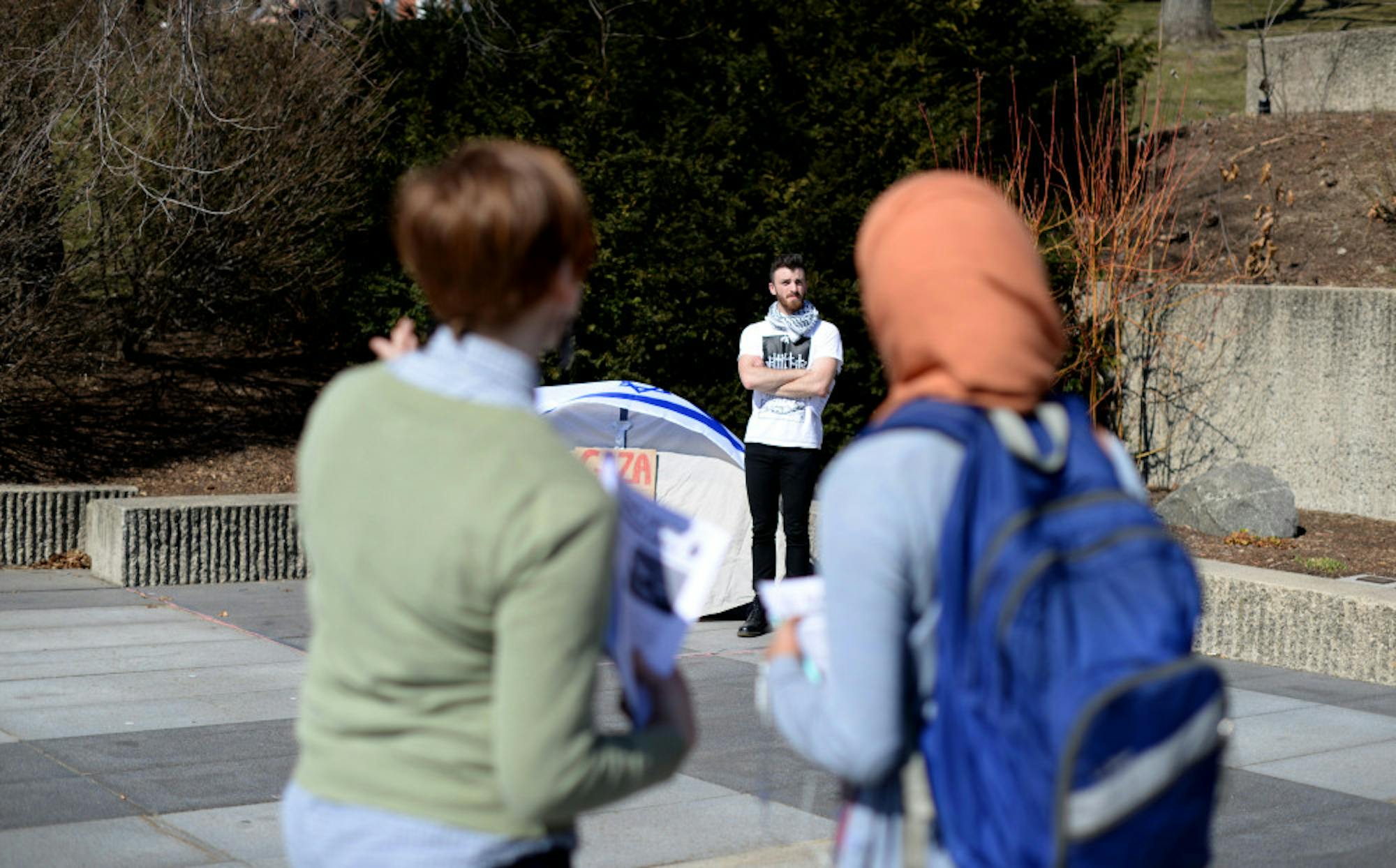Tufts Students for Justice in Palestine (SJP) staged an educational demonstration yesterday on the Tisch Library Patio as a part of its annual Israeli Apartheid Week.
The demonstration involved four stations focusing on the city Hebron in the West Bank, East Jerusalem, the Gaza Strip and a Bedouin community in the Negev Desert. Each station represented an area of Israeli occupation, according to SJP memberSophia Goodfriend. Two of the stations featured tents that represented illegal Jewish occupation on Palestinian land. Israeli flags were hung near the tents to reflect Israeli encroachment.
“We try to draw attention to how the Israeli state systematically discriminates [against] and segregates its Palestinian citizens and those living in occupied Palestine, including those living in the West Bank in exile,” Goodfriend, a senior, said.
At each of the stations, SJP members were available to discuss political issues relevant to the station's area of focus. Members of SJP also distributed zines and leaflets about concerns with Birthright Israel programs and Israeli’s settlement policy, including a publication the group created, titled "Zintifada."
“We were talking about the continuous colonial nature of the occupation as more settlements are being built,” SJP memberMile Krstev told the Daily in an email.
The demonstration was part of SJP's presentation of Israeli Apartheid Week, an international movement which aims “to raise awareness about Israel’s ongoing settler-colonial project and apartheid policies over the Palestinian people,” according to a Israeli Apartheid Week website.
“We’re trying to get people to realize that [apartheid] is a paradigm with which you can see this situation,” SJP member Noah Habeeb said.
Krstev said that while he acknowledges that the term "apartheid" can alienate people who would not identify Israel as an apartheid state, he feels it is the most appropriate language to describe the situation.
“Apartheid is continuously using oppression and actions to continue supremacy of one side over the other," he said. "It doesn’t sound nice but it’s the name we need to use."
The event was not publicized beforehand unlike the other events of Israeli Apartheid Week, which include speakers, panel discussions and a play on Saturday that tells the story of a Palestinian citizen killed by the Israeli police,according to the event’s Facebook page.
Goodfriend explained that the demonstration was not advertised to ensure its success.
“We’re just really trying to educate people and we didn’t want to make a big fuss beforehand to make people who might not agree with us prevent us from doing the action,” she said.
SJP has had a history of clashing with other student groups focused on the Israeli-Palestinian conflict. Notably, on Oct. 28, 2015, SJP demonstrated at Friends of Israel’s (FOI)annual "Taste of Israel" event, according to an Oct. 30, 2015 article in the Daily. Protestors claimed that FOI was appropriating Palestinian food as part of Israeli culture, a claim which FOIco-president Itamar Ben-Aharon denies.

However, Ben-Aharon, a sophomore, said that he did not object to SJP's demonstration yesterday.
“I thought that they did it very respectfully, while I disagree with a lot of what they said,” he said.
Specifically, Ben-Aharon argued that the Israelis were just as much indigenous to the land as the Palestinians, and that while the Jews did get more land, much of it was from the desert and was not useful.
Keren Hendel, vice president of the Tufts American-Israel Alliance and member of the Tufts Students for Two States coalition, also did not object to the protest, but said that she felt the information could have been better presented.
“SJP has the right to express their opinions, just like any other group on campus," she said. "I just wish they used tactics that promoted a more nuanced dialogue on our campus about a very complicated conflict."
Andrew Goldblatt, co-chair of J Street U Tufts, also did not agree with the facts presented at the demonstration.
“At J street U we agree that settlements in the West Bank are problematic and are a road block to a two state solution," he said. "We don't believe Israel is an apartheid state or a settler colonial enterprise and don't support events that paint Israel as such."
Ultimately, SJP members wanted to show that they want to open the discussion about the Israeli-Palestinian conflict with their peers, according to Habeeb, a senior.
“There’s often a perception that we’re not willing to have open discourse which to us is nonsense,” he said. “We have open coffees every Friday where anyone can come and speak with us [and] we have educational events like this where we’ll engage with anyone when they walk about.”
CORRECTION: An earlier version of this article stated that FOI co-president Itamar Ben-Aharon disagrees with SJP's claim that the Israelis removed indigenous Palestinians from their land, however this is incorrect. The Daily regrets this error.







